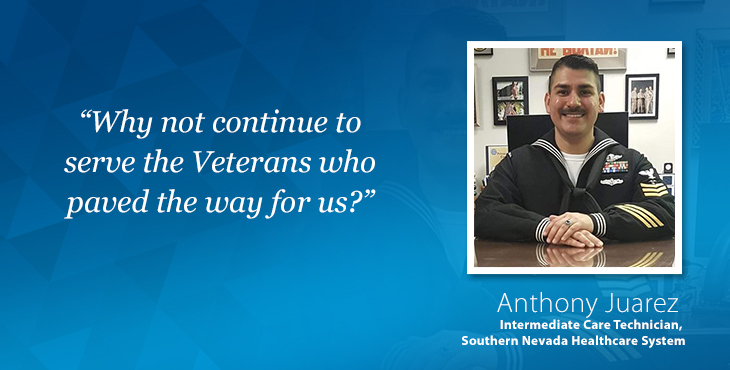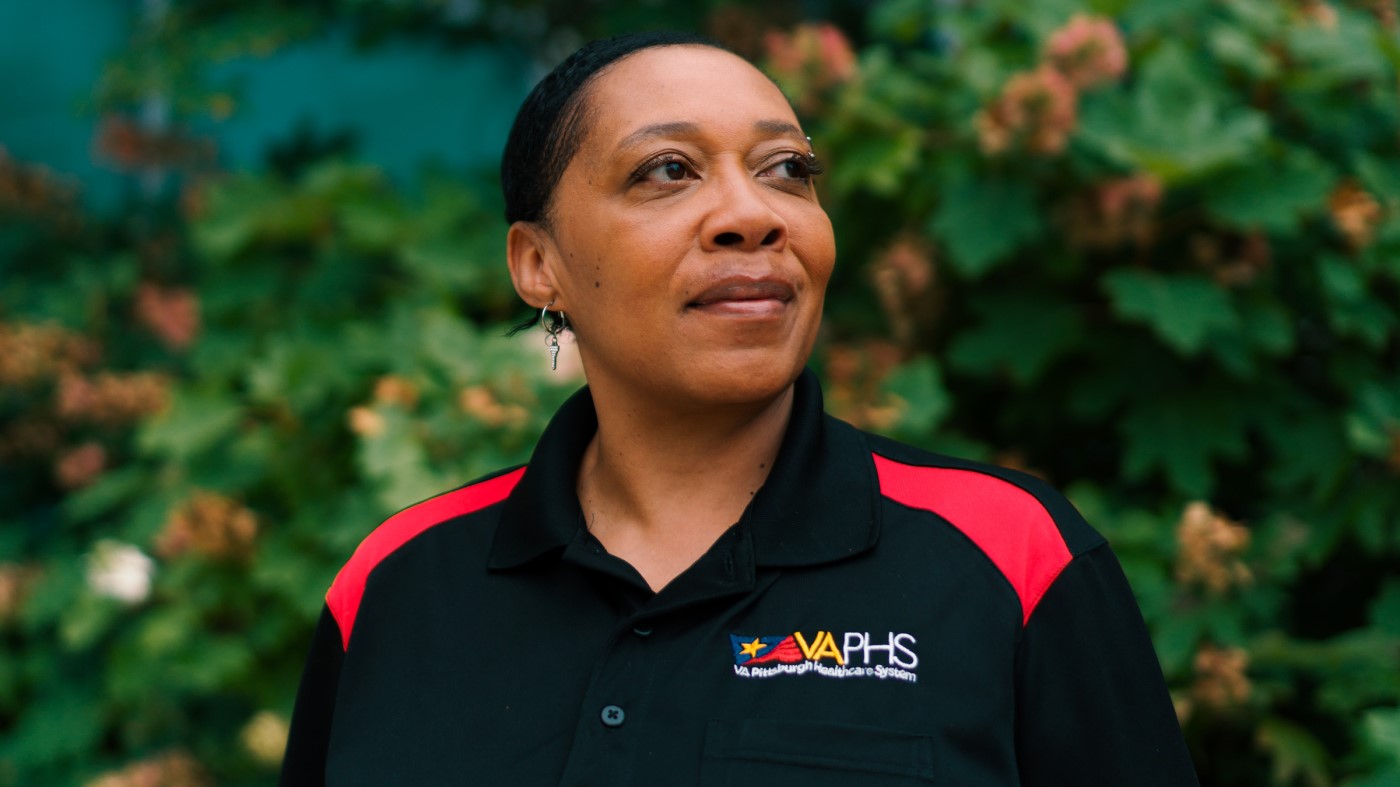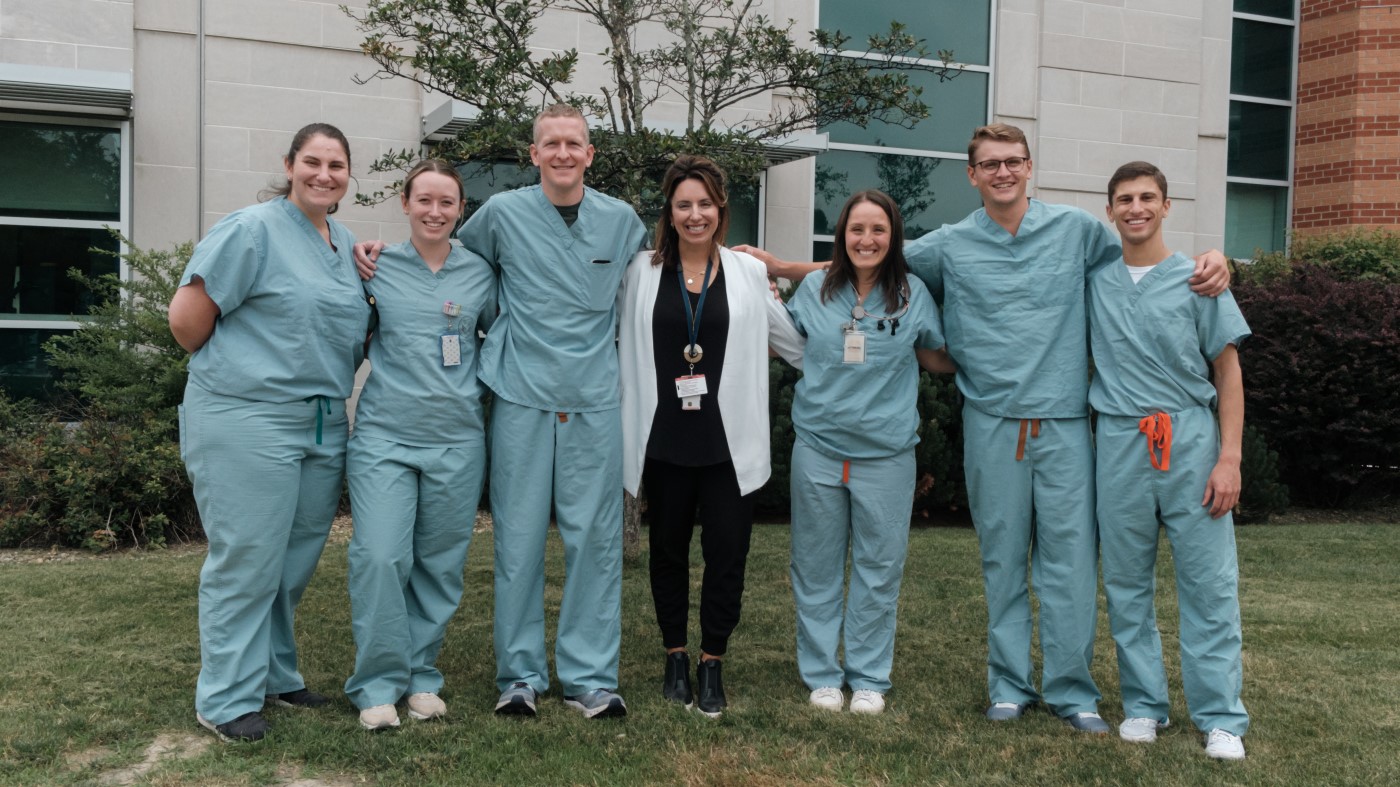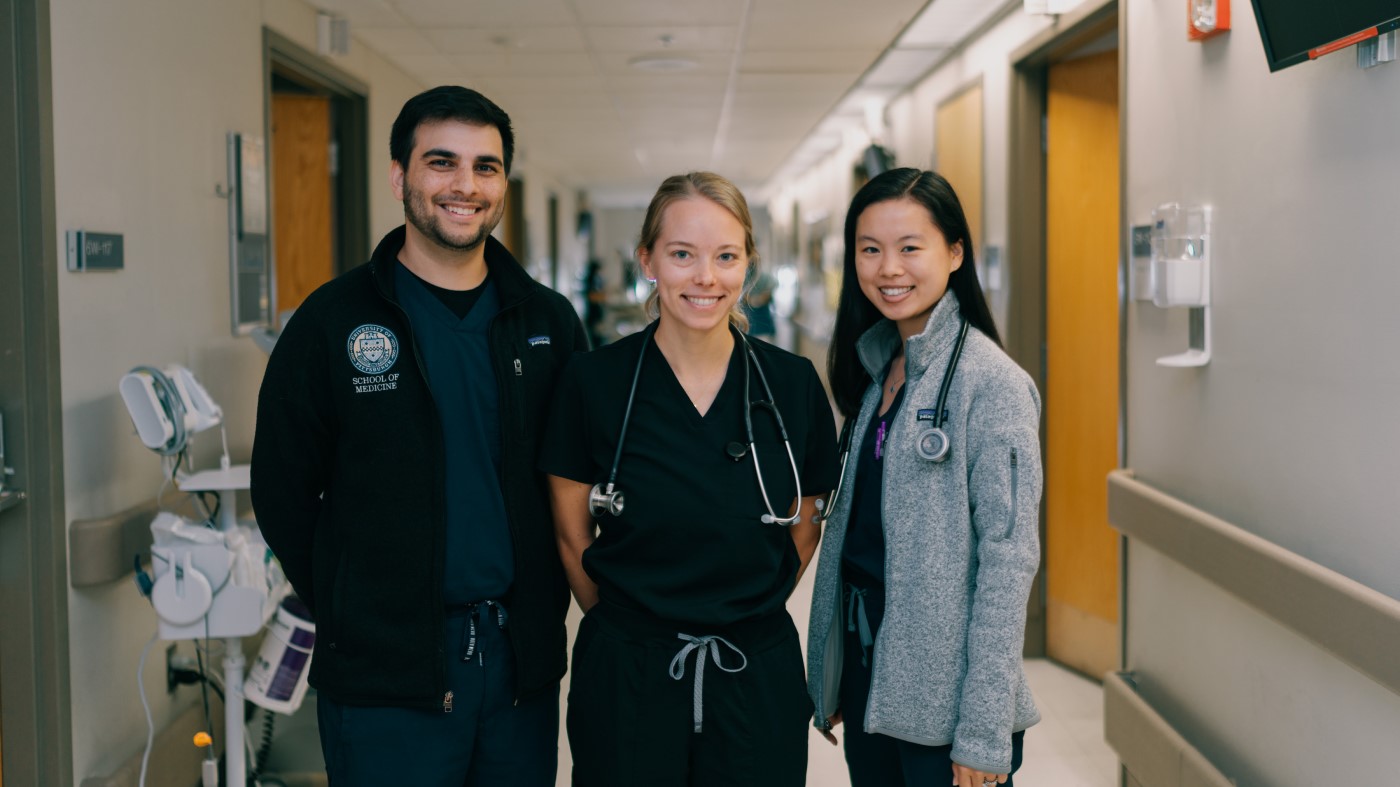Anthony Juarez is an Intermediate Care Technician (ICT) with the U.S. Department of Veterans Affairs (VA) Southern Nevada HealthCare System in Las Vegas. After delivering medical care in the military, Juarez transitioned to civilian life, but struggled to find a well-paying job. He eventually discovered that VA had positions perfectly suited for former military medics and corpsmen, including basic medical technicians, combat medic specialists, basic hospital corpsmen or basic health services technicians. Juarez applied, joined VA and has been in a position focused on dermatology for more than two years.
Juarez was nominated as a Navy Reservist Bureau of Medicine and Surgery Sailor of the year. He was one of four nominees out of an estimated 3,700 Hospital Corpsmen peers in the rank of Petty Officer First Class (E6). He still serves in the Navy Reserve.
In this installment of our #ChooseVA Careers blog series, Juarez explains why he was attracted to a VA career as an ICT after military service and why he thinks other transitioning military professionals should consider working at VA.
What is your primary job at VA?
My primary duties consist of taking the initial patient intake for the patient’s visit, documenting any outcomes for the patient in their chart, assisting with biopsy procedures and processing those biopsies for further laboratory assessment.
What led you to get the job?
I applied to VA as an Advanced Medical Support Assistant (AMSA) in March 2016. After a few short months of working with an in-home healthcare agency, I received a phone call for an interview. Two weeks after the interview, I received a job offer. After a month of processing, I started in August 2016. While at VA, I applied to become an ICT.
Coming from the military, what was appealing about an ICT career at VA?
The two most intriguing aspects to this position were the ability to assist fellow Veterans and to engage in direct patient care again.
When I left active duty, I did everything I could to not become a statistic. I had a job offer and was pre-approved for my VA home loan. When I left active duty to pursue my post-military career, the job I had applied for had fallen through. I lost my VA home loan because I couldn’t get another job. After paying $250 a month to live on a cot in a living room and subsisting on my little savings, I was hired for an in-home healthcare position. At $10 an hour, I worked 12-hour night shifts but was barely able to make ends meet. Being single with no children, I was very fortunate to have fellow Veterans who were VA employees to be my support system in a city where I only knew five people total.
How did you hear about this career?
When I was working as an AMSA in the dermatology clinic, I had a chance to meet with the Nurse Manager. She and I would discuss my military career as Navy Fleet Marine Force Hospital Corpsman. We discussed my clinical experience, deployment capabilities and various leadership positions I’ve held, and she directed me to the Intermediate Care Technician information page, where I could search for open positions.
How is this VA position similar and different from what you did in military service?
This position is similar in the sense that I am still treating our nation’s heroes who share similar stories of service. Key differences are that I don’t don a military uniform to treat patients, and I focus singularly on the well-being of my patients and their overall care in dermatology. For example, I don’t have 28 sailor careers to develop, maintain or progress.
What is the most rewarding part of your job?
There are many rewards to working at VA, and it’s hard to select just one. The one I hold dearest is being able to listen and engage with not just heroes but the history-makers and path-pavers who came before me as a service member. Their reflections on their experiences not only make my job worthwhile but give me great courage to continue to move forward in my VA career. These experiences remind me to maintain a superior performance, just as I did as a leader in my Navy Reserve Unit, and to stay healthy in my personal life.
How has VA helped you grow in your career?
VA has assisted in my growth by allowing me the opportunity to learn a different aspect of leadership. In the military, we learn that even if you don’t like the person you still respect the rank. At VA, I have learned in real time what leadership looks like outside of the military. Genuine leadership is when your teammates above, below, to your right and to your left go above and beyond the call of duty to do the right thing when no one is looking. Leadership is difficult but when it’s pursued with enthusiasm, passion for the cause and commitment to care for your people, you don’t need rank or force to accomplish the mission.
My passion to assist Veterans, active duty service members, reservists and their families led me to create my own nonprofit titled Operation Sacred Response Foundation. We provide care packages to those deployed into harm’s way around the world and care backpacks to Veterans who are homeless.
I match VA’s ICARE values with drive and passion and abide by Susan B. Anthony’s motto that “Failure is impossible!”
What are a few key benefits of working at VA?
What I value most is being able to work for something greater than myself. Of course, having paid time off, retirement benefits, military leave for my continued service and much more are great benefits. However, the privilege to continue using my clinical skills, and to be a path-paver in the ICT community is not only an honor but a distinct privilege.
What story do you most often tell people about your work?
When I am asked about my work, I share the heartfelt gratitude of those who sincerely appreciate what I do at VA and who respect my service. Hearing words of gratitude from those who are most affected by my history of service and current work truly means the world to me.
What would tell other transitioning military professionals or healthcare professionals who are interested in choosing a career at VA?
When I speak to service members about to separate or to fellow Veterans, I first get to know who they are, what drives them and what their experiences are. Then I talk about how that translates to a VA career. I speak about our mission, our mode of service delivery and our impact on patients and colleagues. Everyone wants to impart something meaningful and lasting in their community and the world, and so why not continue to serve the Veterans who paved the way for us?
What else would you like us to know about your work?
My knowledge has grown significantly since working in the VA Dermatology Clinic. Assisting with procedures has provided me with hands-on experience recognizing different skin conditions that are preventable. I am a big advocate of education on dermatological protection and prevention.
What else would you like us to know about your experiences as a VA ICT?
On a very personal note, I couldn’t be more grateful to VA as a whole, to the Defense Health Agency and to the ICT community and all other agencies for their collaboration in creating the Intermediate Care Technician position at VA. Their efforts prove that progress is being made at all levels to ensure that former combat-ready medical personnel have a role once our uniform is placed to rest.
Choose VA today
The ability to engage in patient care again after the military and serve fellow Veterans led Juarez to choose a VA Career. See if an Intermediate Care Technician position at VA is the right choice for you too.
- LEARN how transitioning military medics and corpsmen can Choose VA careers.
- ACCESS FAQs to learn how to speed the hiring process.
- EXPLORE career opportunities for transitioning military medics and corpsmen.
- REACH a recruiter at VAcareers@va.gov.
Topics in this story
More Stories
If you’re looking for an opportunity to provide care to Veterans outside a traditional clinical setting, Home Based Primary Care (HBPC) is a great option.
A key part of your job search is finding the right fit for you and your skills, and workplace culture can impact that dramatically.
VA offers numerous pathways into mental health careers, including scholarship opportunities for college students. Learn more.







I have been taking my healthcare concerns to the V.A. for 30 years all over the country. The care I have received is great. Although I have to say the best is the care I am getting at Orlando Lake Nona.
You might check with your primary physician and ask to be referred to a “physical therapy balance center”.
If your VA Center doesn’t provide this ask for referral.
My wife had experienced lost of balance several times in the last 20 years. Although there are many causes she was diagnosed by a Vestibular Physical Therapist who made the correct call and currently is being treated successfully, for HER condition. FYZICAL center in Tampa
I,m a 93 yr old Army Vet who has lost his balance about 3 yrs ago and it is slowly getting worse
I ve considered going to MAYO CLINIC IN JAX but if I can be treated in Tampa,Fl why ot??
Fyi, i,m a tank Vet of WW 11,KOREA & R V N
DEZIE C REVELS
ARMY MAJ RET